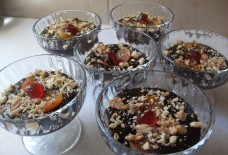Arab Americans Holding onto Their Traditions
By: Shayma Amour/Arab America Contributing Writer
Throughout the last couple of centuries, America has witnessed many waves of Arab immigrants which are referred to as “Arab Americans”. They are one of the most diverse and rich ethnic groups in terms of their cultural backgrounds, language, beliefs, family structure, and values. Although Arab Americans originate from different countries with a variety of linguistical, political, religious and cultural distinctions, they are somehow a connected ethnic group. While Arabs living in some parts of the Arab region tend to be more westernized in the 21st century, Arab Americans managed to keep holding onto the traditions and culture.
Language
Arabic is the official language spoken by Arabs. It is divided into two categories:
- Modern Standard Arabic, which is used in Newscast, Newsprint, and books. Most of the Arabs understand it, but it is not spoken in conversations and in daily life dialogues.
- Local dialects which are different from one country to another and are not understood easily by those speaking a different dialect. For example, people in the Levant area (Syria, Lebanon, Jordan, Palestine) speaking Shami dialect, to some extent, cannot comprehend the North African dialect.
The Arabic Language forms a significant aspect of the Arab-American culture, as more than half of the Arab American population speak Arabic at home other than English. They usually don’t speak it fluently due to the inability to practice the language publicly as in the Arab world; However, the Arab American culture values the knowledge of Arabic.
Unfortunately, losing the native ethnic language is a common phenomenon among minorities but it doesn’t mean losing the ethnic identity. On the other hand, Arab American youths do desire to visit their homeland to learn the Arabic language.
Family Bond
Arabs are naturally family-oriented, meaning that family in the Arab culture and traditions is one of the most important elements in society. For Arab Americans, the family is the most essential social and economic institution. Arab immigrants’ families have a strong relationship, a tight-knit structure and are very connected in almost every aspect of their life.
Unlike the western families which usually lack the sense of bonding, Family loyalty and obligations in the Arab culture take the priority over one’s personal needs. In addition to personal characteristics and achievements, a person’s honor and dignity come from their family in the Arab culture.
Weddings
Arab weddings are LIT! Once spring and summer hit, Wedding season becomes officially on. You should expect to receive a wedding invitation every week. Although Arab youths, whether in the Arab region or in the U.S, are becoming westernized, but they manage to stay loyal and true to their roots. They go through the long process of the traditional Arab weddings, in more of a modernized way. they might slightly differ from one country to another, but here are the general practices expected in an Arab wedding:
The Arab wedding starts first with the “Tulbe” which means the proposal and asking the bride’s hand for marriage. Unlike the American proposal, Arab proposal includes both the groom’s and the bride’s families in it. The families officially acknowledge that the two shall marry. After that, a small engagement ceremony is held to announce their engagement to their relatives, friends, and acquaintances; it’s actually, the formal way of announcing the dating period.
Henna party, which is the equivalent to the bachelorette party, takes place a few days before the actual wedding ceremony. Traditionally, the bride wears her country’s traditional dress like Thobe for example. In this event, the bride’s hands and feet are painted with Henna in beautiful patterns and designs. The bride’s friends and relatives get some Henna designs as well. Of course, delicious food is served, and usually, traditional music is played.
The wedding day is very festive. A “Zaffeh” must be present in every Arab wedding. It is a traditional part of wedding celebrations, where a group of men sings some traditional songs and a group of dancers performs in anticipation of the newly wed’s dramatic entrance. It may also include the “Dabke”, which is a cultural line dance.
Naturally, any Arab wedding includes a delicious open buffet, night-long foot-tapping music and loads of ululations. In some Arab countries, the whole process of wedding celebration could be a week long.
National Arab American Heritage Month (NAAHM)
Americans of Arab and non-Arabs backgrounds ask officials from school districts and governments to recognize April as the National Arab American Heritage Month (NAAHM). Officials celebrate their culture and heritage in the month of April. It is a form of recognition of Arab American achievements and contributions to American society. It is a special opportunity to promote the richness of the various sides of Arab Americans which are usually forgotten, avoided by the media or misrepresented.
Cultural institutions, public entities, and school districts in the U.S engage in Arab cultural events to celebrate the rich heritage.
If you wish to become a member of the National Advisory Board of NAAHM, please contact Dr. Amal David at info@arabamerica.com or, 877-272-2944.



